Saving butterflies, moths and our environment
Celebrating our 40th Anniversary!
1982 - 2022
Glanvilles in good numbers. Today I visited Bonchurch Esplanade (SZ569775) and saw Dingy Skipper (2), Common Blue (4), Large White (2), Red Admiral (1), Glanville Fritillary (20). "Very pleasant weather with a light breeze and plenty of insects about including a mating pair of Glanville fritillaries and a hummingbird hawk-moth. [Posted by Ian Pratt]
Duke season fading out. A trip to Oxenbourne Down (SU710189) resulted in Common Blue (29), Small White (1), Dingy Skipper (5), Green-veined White (2), Brimstone (33), Small Heath (6), Pearl-bordered Fritillary (1), Large Skipper (1), Large White (1), Peacock (1), Red Admiral (4), Orange-tip (1), Painted Lady (2), Duke of Burgundy (3), Green Hairstreak (5). After a rather cloudy start it turned out rather warm and sunny,and have we all missed it. Oxenbourne Down had the most species I've ever seen on a spring day today with (19) species including many Speckled Yellows(50+) at least! With Mother Shipton Moths and Silver Y's thrown in. The Duke of Burgundy is now rather hard to find with one's being seen were rather faded and looking rather sorry for themselves. Another Large Skipper was seen doing battle with several Grizzled Skippers on the top part of the down. [Posted by Ashley Whitlock]
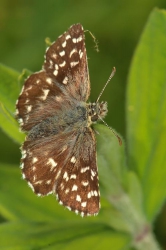 |  | 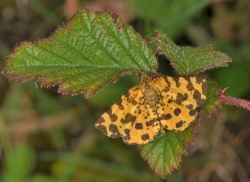 |
| Grizzled Skipper Photo © Ashley Whitlock | Red Admiral Photo © Ashley Whitlock | Speckled Yellow Photo © Ashley Whitlock |
Mullein moth larva. At home (SU592993) I found 10 Mullein moth larvae on a mullein in my garden. [Posted by Roger Forster]
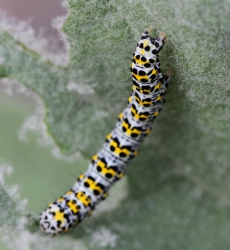 |
| Mullein moth larva Photo © Roger Forster |
Dukes in good numbers at Pillow Mound. A trip to Pillow Mound (SU720209) produced Green Hairstreak (26), Dingy Skipper (47), Grizzled Skipper (30), Duke of Burgundy (48), Brimstone (8), Peacock (2), Orange-tip (1). Further on from Little Butser Hill is another gem called Pillow Mound and here where the scrub has been cleared the Duke of Burgundy seems to be flourishing, along with the Green Hairstreak Grizzled and Dingy Skipper. I sat down on a rather large Ant-Hill which was very comfortable, and just let the butterflies’ whiz around me; at times I couldn't take it all in. There were all sorts of butterflies about, Dukes on territory, a pair of Dukes dangling off of a Hawthorn Bush. At first when I espied them the male was hanging on with his feet, and the poor old girl was just hanging in mid-air. They managed to get together with all 10 legs on terra-ferma, but it did look rather odd. The Green Hairstreaks have had the best season in my record book by far, and closely followed by the Dingy Skipper...phew! [Posted by Ashley Whitlock]
 | 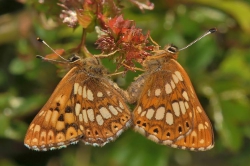 |
| Grizzled Skipper Photo © Ashley Whitlock | Duke of Burgundy pair Photo © Ashley Whitlock |
Pearl-bordered Fritillary doing well in New Forest. A trip to the New Forest produced Pearl-bordered Fritillary (65), Brimstone (12), Speckled Wood (10), Green-veined White (1), Peacock (2), Orange-tip (2). A field trip around one of the well known inclosures,in the New Forest although the weather was warm enough the sun wasn't out for most of the three hours of our walk. The Pearl-Bordered Fritillaries were seen in reasonable numbers, mainly in the grassy areas where most of the old conifers have been extracted and the area has been left to re-generate naturally. The block conifer extraction areas, have been re-planted on the route and are quite quickly becoming overgrown, and here the Pearls were really only seen on the margins, and it was also a struggle to find any Violets in the ditches and mossy banks where the grasses have now taken a hold. We saw several other species but the New Forest isn't a great place to see a lot of species especially in the early part of the summer. We did see lots of Speckled Yellows, Treble Bar, and Double Bar Moths and Common Carpets. We also heard the Cuckoo several times, and observed many other birds along the way. With Frog Spawn, Tadpoles, and Common Newts in the ditches where there were large areas of rain water, an Adder was spotted as well. I would like to take this opportunity to thank everybody who came on the field trip and made it a very interesting few hours. [Posted by Ashley Whitlock]
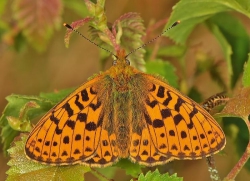 | 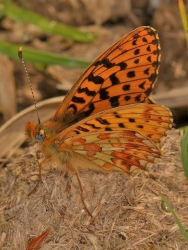 |
| Pearl-bordered Fritillary Photo © Ashley Whitlock | Pearl-bordered Fritillary Photo © Ashley Whitlock |
Narrow Bordered Bee Hawk-moth at Botley Wood. A visit to Botley Wood (SU543097) resulted in Brimstone (20), Common Blue (2), Dingy Skipper (5), Grizzled Skipper (6), Small Heath (4), Narrow Bordered Bee hawk (1), Orange-tip (5). The NBB hawk was seen nectering on bugle briefly twice in the same location in a two hour period. Also singles of hairy hawker, emperor, broad bodied chaser and a rather early black tailed skimmer plus my first hornet of the year. [Posted by Peter Gammage]
Dukes still going string at Noar Hill. A visit to Noar Hill (SU742318) produced Duke of Burgundy (30 "24 male, 6 female"), Common Blue (6 "All male"), Small Heath (6), Dingy Skipper (34), Grizzled Skipper (8), Green Hairstreak (12). On entering the site, I was greeted by a swarm of bees whose queen had clearly flown the nest! Aside from extremely good numbers of Dingy Skipper and the odd Grizzled Skipper, the Common Blue and Small Heath are starting to emerge (a dozen of each seen) and Green Hairstreak are ovipositing all over the site. The Dukes are also really coming out in force! I must have seen over 30, including several mating pairs - and I managed to witness one of the pairings. The most interesting sight was seeing a female land on a Cowslip leaf and then spin on her axis, shuffle backwards until she reached the leaf edge, and then pop out a couple of eggs on the underside of the leaf; it looked quite comical! [Posted by Pete Eeles]
 | 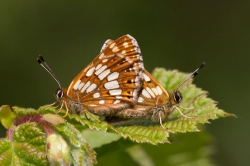 | 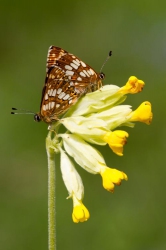 |
| Bee swarm Photo © Pete Eeles | Duke of Burgundy pair Photo © Pete Eeles | Duke of Burgundy pair Photo © Pete Eeles |
Early Drab Looper. A visit to Smithleys Copse, Axmansford. (SU563608) resulted in Drab Looper (1 "Earliest I've ever seen this species."), Green-veined White (4), Peacock (1), Speckled Wood (1). [Posted by Andy Bolton]
Good showing at Magdalen Hill Down. Today I visited Magdalen Hill Down (SU508291) and saw Brown Argus (2), Green-veined White (1), Grizzled Skipper (1), Small Tortoiseshell (80 Larval), Narrow-bordered 5-spot Burnet Moth (1 Larval). The weather for the first Wednesday of the year was changeable with drizzle, sun and cloud. The walk was well attended but the butterflies were only flying when the sun came out. Other butterflies reported were Green Hairstreak, Common Blue and 2 unidentified whites. [Posted by Sue Lambert]
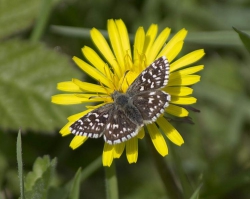 | 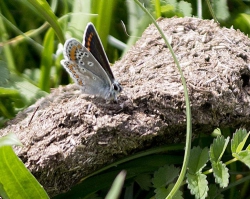 | 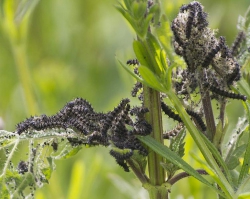 |
| Grizzled Skipper Photo © Sue Lambert | Brown Argus Photo © Sue Lambert | Small Tortoiseshell larval web Photo © Sue Lambert |
Hummingbird Hawk-moth in Hants!. Today at home, 24 Ward Close (SU360467), I saw Hummingbird hawk Moth (1 "Came to feed in lilac tree for 2-3 minutes then flew off"). [Posted by Brian Cartwright]
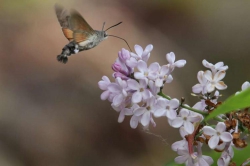 |
| Hummingbird Hawk-moth Photo © Brian Cartwright |
Old Winchester Hill on form. Today I visited Old Winchester Hill (SU640207) and saw Dingy Skipper (40), Grizzled Skipper (10), Small Copper (5), Peacock (4), Brimstone (40), Duke of Burgundy (3), Common Blue (1), Green Hairstreak (12), Small Heath (1), Orange-tip (4), Holly Blue (2), Small White (2). It was cool and rather windy in exposed areas on Old Winchester Hill today, but as the hour ticked by the sun was out and there wasn't a cloud about, rather good for a low pressure system. The butterfly count was quite impressive once the area warmed up. I was particularly looking for the Duke of Burgundy, as if I hadn't seen any this year...yet! The reason is the site is very good for the specie in places, with lots of scrub, but the Cowslip count is quite low in density in many places. I counted three, and they were all very separate, at least a quarter of a mile from each other, there are colonies here but in very low densities. In fact there are sheep still grazing in many of the areas, and I saw a Duke flying around the legs of a sheep! [Posted by Ashley Whitlock]
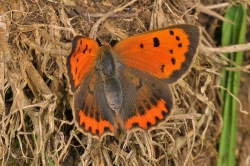 | 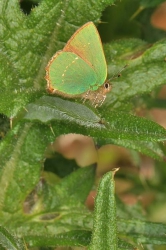 | 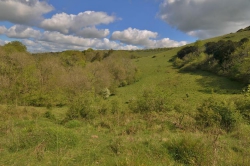 |
| Small Copper (female) Photo © Ashley Whitlock | Green Hairstreak Photo © Ashley Whitlock | Old Winchester Hill Photo © Ashley Whitlock |
Good numbers of Dukes at Butser Hill. A trip to Butser Hill (SU714201) resulted in Duke of Burgundy (32), Brimstone (15), Orange-tip (3), Common Blue (1), Dingy Skipper (45), Grizzled Skipper (10), Green Hairstreak (10), Peacock (1). In complete contrast to Old Winchester Hill, the area I visited for the Duke on Butser Hill today is riddled with Rabbit scrapes, and Rabbit burrows, flying in the face of the Dukes and Rabbits don't mix, well they seem to be in complete harmony with each other. In fact today was one of the best counts I've had a this particular area. Once I had my eye in from constant heckling from Dingy Skippers, which were in particular good numbers, the Dukes really stood out. Most were on the Eastern side of the slope going down to the scrubby area at the bottom. This particular area is ablaze with Wild Strawberry, Ground Ivy and Germander Speedwell and there were butterflies and moths everywhere. Good counts of Cinnabar Moths (4). [Posted by Ashley Whitlock]
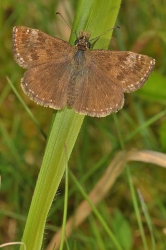 | 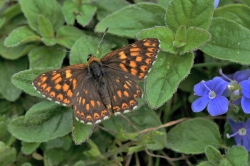 |
| Dingy Skipper Photo © Ashley Whitlock | Duke of Burgundy Photo © Ashley Whitlock |
Adonis Blue now out. Today I visited Bonchurch Down, Ventnor, IOW (SZ568775) and saw Adonis Blue (1 "male"), Brown Argus (20), Common Blue (3), Dingy Skipper (3), Green Hairstreak (4), Orange-tip (1 "male"), Small Heath (1), Speckled Wood (1), Wall (2). [Posted by Peter Hunt]
Good numbers of Duke of Burgundy at Noar Hill. A trip to Noar Hill (SU745318) resulted in Brimstone (14 "13 Male 1 Female"), Orange-tip (14 "13 Male 1 Female"), Small White (5), Large White (1), Speckled Wood (3), Green Hairstreak (5), Common Blue (1), Duke of Burgundy (17), Dingy Skipper (3). I spent 4 hours walking around the site. Temperature was 16 degrees. Duke of Burgundy's were found in their usual favourite places, while Green Hairstreaks were not easily disturbed allowing many photos. Saw what at first I thought was a Holly Blue until it settled and realised it was a Common Blue, my first sighting this year. [Posted by Roy Symonds]
Common Blue now out. Today I visited Noar Hill (SU740319) and saw Dingy Skipper (16), Duke of Burgundy (8), Brimstone (3), Orange-tip (3), Peacock (2), Common Blue (1). [Posted by Nick Lawrence]
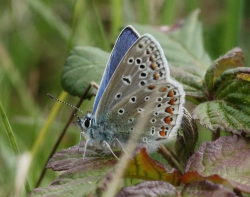 |
| Common Blue (male) Photo © Nick Lawrence |
Argent and Sable at Bentley Wood. A trip to Bentley Wood (SU255285) resulted in Brimstone (3 "Egg laying"), Duke of Burgundy (1 "Very fresh male in Eastern Clearing"), Pearl-bordered Fritillary (5 "3 males anf 2 females"), Argent And Sable Moth (1). A single male Duke holding a territory in the Eastern Inclosure doing battle with The Pearl Bordered Frits . The Duke was immaculate as were the PBFs , hopefully numbers will build over the following week. Was amazed to see a very early Argent & Sable Moth which refused to be photographed much to the frustration of myself and another observer . A first for me at this site .Sadly no sightings of Grizzled or Dingies . The whole of the Eastern area is still very waterlogged and i am wondering if the skippers had a hard time during the floods . . . . time will tell . [Posted by Dave Law]
Pearl-bordered Fritillary numbers building at Bentley Wood. Today I visited Bentley Wood (Eastern Clearing) (SU260293) and saw Pearl-bordered Fritillary (7), Brimstone (8), Orange-tip (2), Peacock (5), Green-veined White (2). The recent spell of cool and damp weather has delayed the emergence of the pearl-bordered fritillaries in Bentley Wood, however their numbers are now gradually building. [Posted by Alan Thornbury]
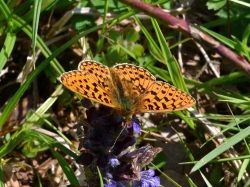 | 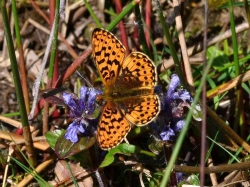 |
| Pearl-bordered Fritillary Photo © Alan Thornbury | Pearl-bordered Fritillary Photo © Alan Thornbury |
Hyden Wood Field Trip. Today I led a field trip to Hyden Wood (SU696187) and saw Orange-tip (17), Brimstone (30), Peacock (5), Green-veined White (6), Red Admiral (1), Small Tortoiseshell (1), Comma (1). A lovely walk around a typical Beech Woodland in the Spring, although some of the things I promised in the Newsletter never happened, we never saw any Primroses, Never heard the Cuckoo, which is quite worrying actually, I've normally heard it by now. Although there were bags of Orange Tips and Brimstones to be had in the hedgerows, we also observed a male Robin sat very comfortably in its nest in a mossy bank, and it was still there when we returned the same way about an hour later. The Blue bells are now past there best, but we didn't really care as it just a lovely walk in each others company, and I would like to thank everybody who attended, and joined me in the pub after the walk. [Posted by Ashley Whitlock]
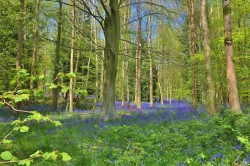 | 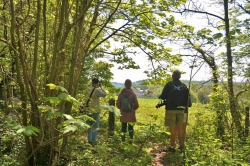 | 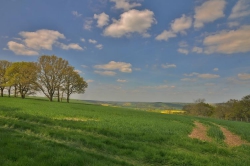 |
| Photo © Ashley Whitlock | Photo © Ashley Whitlock | Photo © Ashley Whitlock |